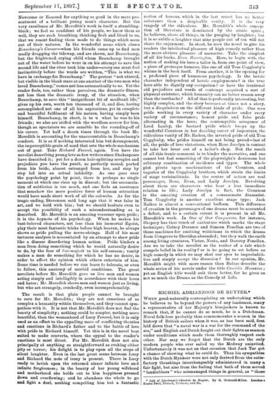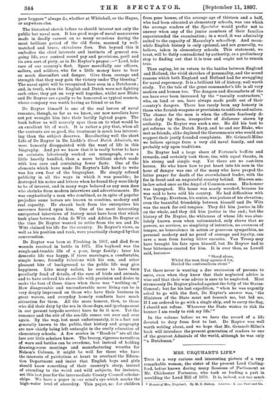MICHIEL ADRIANZOON DE RUYTER.* WHEN good-naturedly contemplating an undertaking which
he believes to be beyond the powers of any landsman, many a representative of her Majesty's bluejackets is known to remark that, if he cannot do so much, he is a Dutchman. Naval folk-lore probably thus commemorates a season in the history of British sailors when it was, as has been said, first laid down that "a naval war is a war for the command of the sea," and English and Dutch fought out their fights as seamen under conditions which made them thoroughly respect each other. Nor may we forget that the Dutch are the only modern people who ever sailed up the Medway uninvited. Unfortunately it was not on that occasion that Jack Tar got a chance of showing what he could do. Thus his sympathies with the Dutch Mynkeer were not only derived from the sable- factory thrashings interchangeably administered in many's. fair fight, but also from the feeling that both of them served " landlubbers " who mismanaged things in general, as "those
• Life of Lieutenant-Admiral Euyter. By G. GrinnelhMilne. Loud** Began Paul, Trench, Triibner, and Co.
poor beggars" always do, whether at Whitehall, or the Hague, or anywhere else.
The historical sketch before us should interest not only the public but naval men. It has good maps of naval manoeuvres made in deadly earnest on so many occasions during the most brilliant period of the old fleets, manned by well- matched and brave, chivalrous foes. But beyond this it embodies the chief interests and instincts of general sea- going life, ever centred round pay and provisions, peril and its own sort of piety, as in De Ruyter's prayer :—" Lord, take -care of our country's fleet. Spare mercifully our officers, sailors, and soldiers, who for a little money have to bear so much discomfort and danger. Give them courage and strength that they may gain the victory under Thy blessing." The naval spirit will be recognised here even in a Dutchman ; and, in truth, when the English and Dutch were not fighting each other, they got on very well together, whilst now Blake and De Ruyter are equally to be honoured as typical seamen, whose company was worth having as friend or as foe.
De Ruyter himself is one of the real heroes of naval romance, though, so far as we know, our new novelists have not yet wrought him into their luridly lighted pages. The book before us will scarcely spur them on to what would be an excellent bit of work. It is rather a pity that, when all the contents are so good, the treatment is much less interest- ing than the subject deserves. Recollecting well the short Life of De Ruyter in De Liefde's Great Dutch Admirals, we were honestly disappointed with the want of life in this biography. And yet we know that it is really better to have an accurate, laboriously worked out monograph, even a little heavily handled, than a more brilliant sketch made with less care and containing fewer facts. One of the elements which have made De Ruyter's Life hard to write was his own fear of the biographer. He simply refused publicity in all the ways in which it was possible ; he destroyed his notes and letters when he found they were likely to be of interest, and in many ways behaved as any man does who shrinks from modern interviews and advertisements. He was emphatically a man who combined, as in spite of popular prejudice some heroes are known to combine, modesty and real capacity. He shrank back from the enterprises his successes forced upon him. One of the most interesting unreported interviews of history must have been that which took place between John de Witt and Adrian De Ruyter at the time De Ruyter wanted to retire from the sea and De Witt claimed his life for the country. De Ruyter's views, as well as his position and rank, were practically changed by that conversation.
De Ruyter was born at Flushing in 1607, and died from wounds received in battle in 1675. His boyhood was the rough-and-tumble life of a poor, large family ; later his domestic life was happy, if three marriages, a comfortable, simple home, friendly relations with his son, and other pleasant bits of background to the public life may give happiness. Like many sailors, he seems to have been peculiarly fond of details, of the care of birds and animals, and to have ordered his shore-life with precision and desire to make the best of those times when there was " nothing on." How disagreeable and uncomfortable mere living can be is very deeply impressed on those who have their business in great waters, and everyday homely comforts have much attraction for them. All the more honour, then, to those who did their duty by the sea in those days, and (perhaps most in our present torpedo service) have to do it now. Yet the romance and the stir of the sea-life comes out over and over again. By the way, but most unfortunately, it is a fact not generally known to the public, that history and geography are now chiefly being left untaught in the costly education of elementary schools. A few stories in " Readers " are all the lore our little scholars know. The breezy, vigorous narratives of wars and battles can be overdone, but instead of holding drawing-room meetings and manufacturing wreaths for Nelson's Column, it might be well for those who have the interests of patriotism at heart to overhaul the Educa- tion Department and insist that English boys and girls should know something of their country's story, instead of attending to the weird and wild subjects, for instance, set this last year for the intermediate County Council scholar- ships. We have a paper in our mind's eye which marks the high-water level of absurdity. This parer, set for children
from poor homes, of the average age of thirteen and a half, who had been educated at elementary schools, was one which the average readers of the Spectator would prefer not to
answer when any of the junior members of their families superintended the examination ; in a word, it was admirably suited to the capacity of Macaulay's schoolboy. And mean- while English history is only optional, and not generally, we believe, taken in elementary schools. This statement, we trust, will be flatly contradicted by authority, as a preliminary step to finding out that it is true and ought not to remain true.
Thus saying, let us return to the battles between England and Holland, the vivid sketches of personality, and the sound reasons which both England and Holland had for struggling for naval supremacy. It is a brilliant bit of history, well worth study. Yet the tale of the great commander's life is all very modern and human too. The dangers and discomforts of the sea have ever been increased by the " rascally contractors," who, on land or sea, have always made profit out of their country's dangers. There has rarely been any honesty in those who furnish weapons or provisions to soldiers and sailors.
The chance for the men is when the officers fearlessly do their duty by them, irrespective of disfavour shown by authority. De Ruyter was such a one. He did his best to get reforms in the Dutch Navy, and he and our Blake, who met as friends, alike deplored the Governments who would not support their justly founded complaints. Mr. Grinnell-Milne we believe springs from a very old naval family, and can probably rely upon traditions.
De Ruyter had a large share of Fortune's buffets and rewards, and certainly took them, too, with equal thanks, in his strong and simple way. Yet there are no cast-iron heroes. He who knew how to put heart into his men in the hour of danger was one of the many who have prayed the bitter prayer for death of the overwhelmed leader, with the foe in front and an ungrateful country behind. His own son- in-law acted once as the Angel of Common-sense. His honour was impugned. His home was nearly wrecked, because he was said to have sold his country. He had difficulties with Van Tromp; Evertsen, his senior, was jealous of his elevation; even the beautiful friendship between himself and De Witt was the mark for evil tongues. They did him justice in life on the whole, and they did him justice in the end ; but the history of De Ruyter, the whiteness of whose life was abso-
lutely known even when calumniated, only shows that no powers, no services, no simplicity of intention, no evenness of
temper, no benevolence in action or generous sympathies, no personal modesty and no proof of courage and loyalty, can save a man from having bitter enemies. Van Tromp may have brought his fate upon himself, but De Ruyter had to bear bitterness created for him. It is ever thus, as Lowell said, heroes-
" Stood alone, Whilst the men they agonised for, Hurled the contumelious stone "
Yet there never is wanting a due succession of persons to serve, even when they know that their neglected advice is wise and that their wise advice is sure to be neglected. Most strenuously De Ruyter pleaded against the folly of the States- General ; but for his last expedition, " when he was urgently asked to go with the fleet, De Ruyter's answer was, the Ministers of the State must not beseech me, but bid me. If I am ordered to go with a single ship, and to carry the flag, I should not refuse. Wherever the State wishes to risk its banner I am ready to risk my life.' " In the volume before us we have the record of a life devoted to duty from first to last. De Ruyter was well worth writing about, and we hope that Mr. Grinnell-Milne's book will introduce the present generation of readers to one of the greatest Admirals of the world, although he was only "a Dutchman."



































 Previous page
Previous page